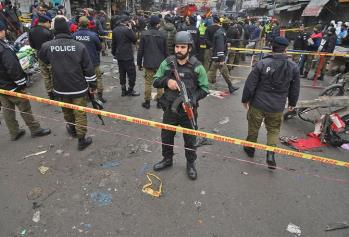Alwaght- Despite many side issues, this year’s Munich Security Conference saw a considerable proposal by the Qatari Emir Tamim bin Hamad Al Thani on the West Asia region. In the second day of the conference, Sheikh Tamim called on the West Asian states to forge an EU-style security pact, urging the nations to set aside disputes and learn from the European countries to pave the wave for the region’s peace and welfare.
But why did the Qatari emir make such a proposal and how practical is it?
Security pact under the shadow of rift with Saudi Arabia
Emir of Qatar has stressed that all countries’ joint work towards stability and security should no longer remain a pipe dream for the regional nations, pointing to the many threats that endanger the region, adding that the pact was needed to “pull back the region from the brink.”
Reuters news agency, reflecting Tamim’s words and especially highlighting the region’s dangerous conditions, described the Qatari leader’s remarks a reaction of Doha to the Saudi Arabian and its allies’ policies in relation to the Persian Gulf Arab emirate, which has been isolated over the past seven months by trade and travel sanctions imposed by the United Arab Emirates, Saudi Arabia, Bahrain and Egypt over accusations - denied by Doha - that it supports terrorism and regional rival Iran. The news agency maintained that the proposal comes with the aim to foil the anti-Doha measures of Riyadh.
Reuters’ claims on the emir’s aims at the MSC are not irrelevant to the regional circumstances. Saudi Arabia and the United Arab Emirates since last May severed diplomatic ties with Qatar and imposed an all-out blockade for what they called Doha’s support for the terrorist groups in the region, something the Qatari leaders strongly rejected, arguing that the embargo came as a cost of Doha’s independent stances. As the isolation of Qatar continues, it is not a surprise that the Qatari sheikh now talks about a security pact for the region.
Is the suggestion practical?
It is significant to examine the applicability of the Qatari idea. Can the West Asian states be expected to unite under a security pact similar to present-day Europe? There are some hurdles to that.
Border disputes
Despite the fact that Qatar’s proposal involves a collective security pact, it should be taken into consideration that even if the matter is reaching the minimum security agreements, the region lacks the conditions necessary to settle the border challenges. The Persian Gulf Arab sheikhdoms since their foundation following the collapse of the Ottoman Empire after the Second World War inherited border rifts that have continued to date.
A look at the history leads to the fact that the eight Persian Gulf states have some 23 cases of territorial disputes. Saudi Arabia disagrees with Qatar over the Al-Khufos border region and also with Bahrain over a region called Fishat Abu Safa which includes two Islands, Greater Lubaynah and Smaller Lubaynah. None of the parties looks poised to take back its claims of ownership. Since 1922, Riyadh has had also row with Kuwait over the oil and gas-rich Qarwa and Umm al Maradim islands. Moreover, Saudi Arabia, the UAE, and Oman claim to own the Al Buraimi fertile region on the three countries’ common border.
The border disputes are a common matter in the region not only among the Arab states but also others. Turkey, for example, holds claims on some Iraqi territories. There are other claims made by other countries. The territorial rows are majorly a legacy of the artificial borders drawn by the international powers before and after the First and Second World Wars. Sykes-Picot Agreement, reached between France and Britain in 1916, which redesigned the countries’ borders and the map of the region as a whole is one of the causes of the today’s border disputes. With the border discords, not to mention the ideological and historical disputes, it is roughly unlikely for the West Asia region to see a collective agreement similar to that of Europe.
Limited security pacts
Having in mind that an inclusive regional security treaty is impossible to forge, the region may see limited bilateral or multilateral unifying blocs. But can the Persian Gulf States or the non-Arab Muslim countries like Iran and Turkey or Levant nations such as Syria, Lebanon, and Palestine agree on small-size, sub-regional security agreements?
With a looking back at the Saudi-Qatari tensions as well as the border disputes of the Arab states which signal the unsuccessful experience of the (Persian) Gulf Cooperation Council, it is very likely that any new Arab monarchies’ security pact will be doomed to failure. In Levant region, the status of the occupied Palestinian regions is unclear, and neither Syria nor Lebanon have any intention to recognize the Israeli regime. So, the only remaining parties are Iran, Iraq, and Turkey which can forge a security pact, although the past experiences manifested Ankara’s volatile foreign policy. Its tensions with the West while being a member of the NATO provide the notion that the Turkish foreign policy is subject to highs and lows in different circumstances.
Regional states’ various foreign policy foundations
Security pact in Europe has passed a rather easy course of the foundation. The US, a pole in a bipolar world of the Cold War, had a will to bring the European Union to life. The US contribution to the bloc pointed the compass of the Western European states to Washington to date. In fact, in those circumstances, it was not hard for Europe to gather under the umbrella of the European Union.
However, those conditions do not exist in West Asia. While in the south of Persian Gulf the Arabs are tightly close to Washington, in the north of the region the Islamic Republic of Iran, insisting on its absolute independence in the policy-making, is far away from the US in terms of foreign policy.
On the other side, some countries like Iraq and Turkey try to keep a balance of relations with Washington on the one hand and Moscow on the other hand. In such a complicated situation, it is crystal clear that commonalities of the West Asian state are at their lowest level. To put it differently, their foreign policy stances can hardly be closer to each other’s to a degree that the way is paved for a collective security treaty. This should be largely blamed on their various foreign policy foundations. So, with the political and ideological differences strongly standing, an inclusive security pact in West Asia at least in the short run is unthinkable.
Regional security agreements outlook
While the regional states’ possibility of collective unity is hit by border disputes, discords in foreign policy, and ideological conflicts, there is no much hope in seeing such thing as West Asia security pact. Instead, at best, some countries like Iran and Syria, or Turkey and Qatar, or Saudi Arabia and Bahrain may pursue their bilateral security cooperation. With a consideration of the present consequences, bilateral security pact may be close to reality but a comprehensive treaty in the highly messy region will remain unachievable.



























